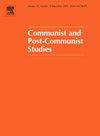Social Class and Ethnocentric Worldviews
IF 1.3
4区 社会学
Q3 INTERNATIONAL RELATIONS
引用次数: 3
Abstract
The link between socioeconomic status (SES) and ethnocentric worldviews is well established in the literature, with countless studies showing the effect of SES on a variety of attitudes, preferences, lifestyles, and behaviors. This literature has been revisited in recent studies on the resurgence of the Far Right, with claims of the rise of “working-class populism,” according to which the working class is more likely to identify with right-wing and populist claims. In the post-Yugoslav context, along with the turbulent socioeconomic and political transformation from socialism, research has also shown that “everyday” people’s understandings of themselves and of others are very much stratified by education, occupational status, urban/rural residence, and region, pointing to a marked effect of SES on civic/ethnic identification, attachment to Europe, ethnic exclusivism, and gender/sexual conservatism. Yet, the nature of the link between socioeconomic status and nationalist attitudes is still insufficiently understood. In this article, we go beyond the traditional focus on cultural explanations, instead relying on cross-sectional quantitative survey data to shed light on important class differences in worldviews of people living in Croatia and Serbia. We find that education remains the most robust predictor of nationalist attitudes, while age, gender, income, and religiosity matter to various degrees. We conclude with a discussion on the continuing importance of SES in understanding ethnocentric worldviews, from Brexit and Trump to the former Yugoslavia.社会阶级与民族中心世界观
社会经济地位(SES)和以种族为中心的世界观之间的联系在文献中已经得到了很好的证实,无数的研究表明社会经济地位对各种态度、偏好、生活方式和行为的影响。在最近关于极右翼复兴的研究中,这些文献被重新审视,声称“工人阶级民粹主义”兴起,根据这一说法,工人阶级更有可能认同右翼和民粹主义的主张。在后南斯拉夫背景下,随着社会主义的动荡社会经济和政治转型,研究还表明,“日常”人们对自己和他人的理解在很大程度上是按教育、职业地位、城市/农村居住和地区划分的,这表明社会经济地位对公民/种族认同、对欧洲的依恋,种族排斥主义和性别/性保守主义。然而,社会经济地位和民族主义态度之间联系的本质仍然没有得到充分的理解。在这篇文章中,我们超越了传统上对文化解释的关注,而是依靠横断面定量调查数据来揭示克罗地亚和塞尔维亚人民世界观的重要阶级差异。我们发现,教育仍然是民族主义态度的最有力预测因素,而年龄、性别、收入和宗教信仰在不同程度上都很重要。最后,我们讨论了SES在理解以种族为中心的世界观方面的持续重要性,从英国脱欧和特朗普到前南斯拉夫。
本文章由计算机程序翻译,如有差异,请以英文原文为准。
求助全文
约1分钟内获得全文
求助全文
来源期刊

Communist and Post-Communist Studies
Multiple-
CiteScore
1.90
自引率
0.00%
发文量
23
期刊介绍:
Communist and Post-Communist Studies is an international journal covering all communist and post-communist states and communist movements, including both their domestic policies and their international relations. It is focused on the analysis of historical as well as current developments in the communist and post-communist world, including ideology, economy and society. It also aims to provide comparative foci on a given subject by inviting comments of a comparative character from scholars specializing in the same subject matter but in different countries.
 求助内容:
求助内容: 应助结果提醒方式:
应助结果提醒方式:


